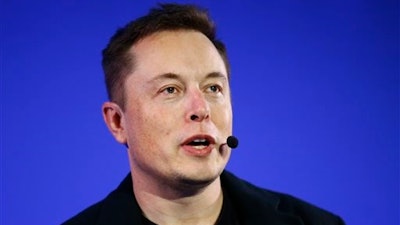
DETROIT (AP) — Once again, Tesla Motors is staring down the naysayers.
CEO Elon Musk's surprised investors Wednesday with a promise to make 500,000 cars per year by 2018, two years ahead of plan — a brash projection given that Tesla has missed smaller production targets in the past.
Auto industry analysts balked. Many doubt that Tesla has the cash, plant capacity or manufacturing expertise to pull off those numbers.
"This is beyond challenging," said Jeff Schuster, senior vice president for forecasting at the consulting firm LMC Automotive. "There are so many things that would have to be lined up in a very short amount of time for that to happen."
Tesla's shares dropped 5 percent to $212.02 Thursday.
But the auto industry and some on Wall Street have been wrong before about 13-year-old Tesla. It has sold more than 110,000 vehicles worldwide even without a traditional dealer network. The company has never made a full-year profit but its market value is more than half that of General Motors Co. U.S. sales of Tesla's Model S luxury sedan jumped 51 percent last year, even as luxury competitors from Mercedes and Audi saw big sales declines. It doesn't advertise, but drew lines hundreds deep in March when it started taking deposits for its newest car, the lower-cost Model 3.
Tesla has plenty of believers. Among them is Andrea James, a longtime Tesla analyst with Dougherty and Co. She announced Wednesday she was resigning and said she can't wait to buy Tesla shares.
"Does Tesla have a technology lead that is real? Can Tesla build it? Will people come? Yes, yes and yes," James said.
Skeptics point to Tesla's significant issues with bringing vehicles to market in the past. The Model X SUV, Tesla's latest vehicle, was delayed by more than 18 months while Tesla fiddled with its complicated features, like gull-wing rear doors and free-standing rear seats. That has many doubting Tesla can meet its goal of producing 100,000 to 200,000 Model 3 sedans in the latter half of 2017.
"We want to believe, but we simply cannot," said Brad Erickson of Pacific Crest Securities in a note to investors.
Tesla has also missed production targets before. In the summer of 2014, Musk said Tesla expected to achieve a run rate of 100,000 vehicles by the end of 2015. But this year, the company only expects to deliver between 80,000 and 90,000 vehicles.
Musk said production of the Model X can't be compared to the much less complex Model 3. Musk says the company can apply lessons from the Model X to the Model 3, including setting firm deadlines for suppliers.
"Tesla is really hell-bent on being the world's best at manufacturing," Musk said.
Musk hinted that Tesla will soon hire a big-name vice president to improve manufacturing. Tesla's vice presidents of manufacturing and production recently stepped down.
Others question whether Musk has the money to meet his goals. Tesla ended the first quarter with $1.4 billion in cash, but Schuster says adding an assembly line and tooling to make 250,000 or more Model 3s would cost an estimated $1 billion alone. And while Tesla collected an estimated $400 million in deposits for the Model 3, the money is refundable if customers decide not to buy.
Tesla said it now expects to spend more than $2 billion on capital projects this year, up from its forecast of $1.5 billion. Musk said Tesla is open to raising capital but he didn't give a timeframe.
Schuster said he predicts Tesla will make around 200,000 vehicles in 2018, or less than half the forecast of 500,000. Morgan Stanley analyst Adam Jonas says 500,000 vehicles is possible for Tesla — but not until 2025.
"I can't argue with what he has been able to accomplish so far, but we're taking about a complete magnitude change in complexity," Schuster said of Musk.
Musk said he may yet change minds.
"What I find ironic about a lot of the naysayers is that the very same people will transition from saying, 'It was impossible' to saying 'It was obvious,'" he said.






















